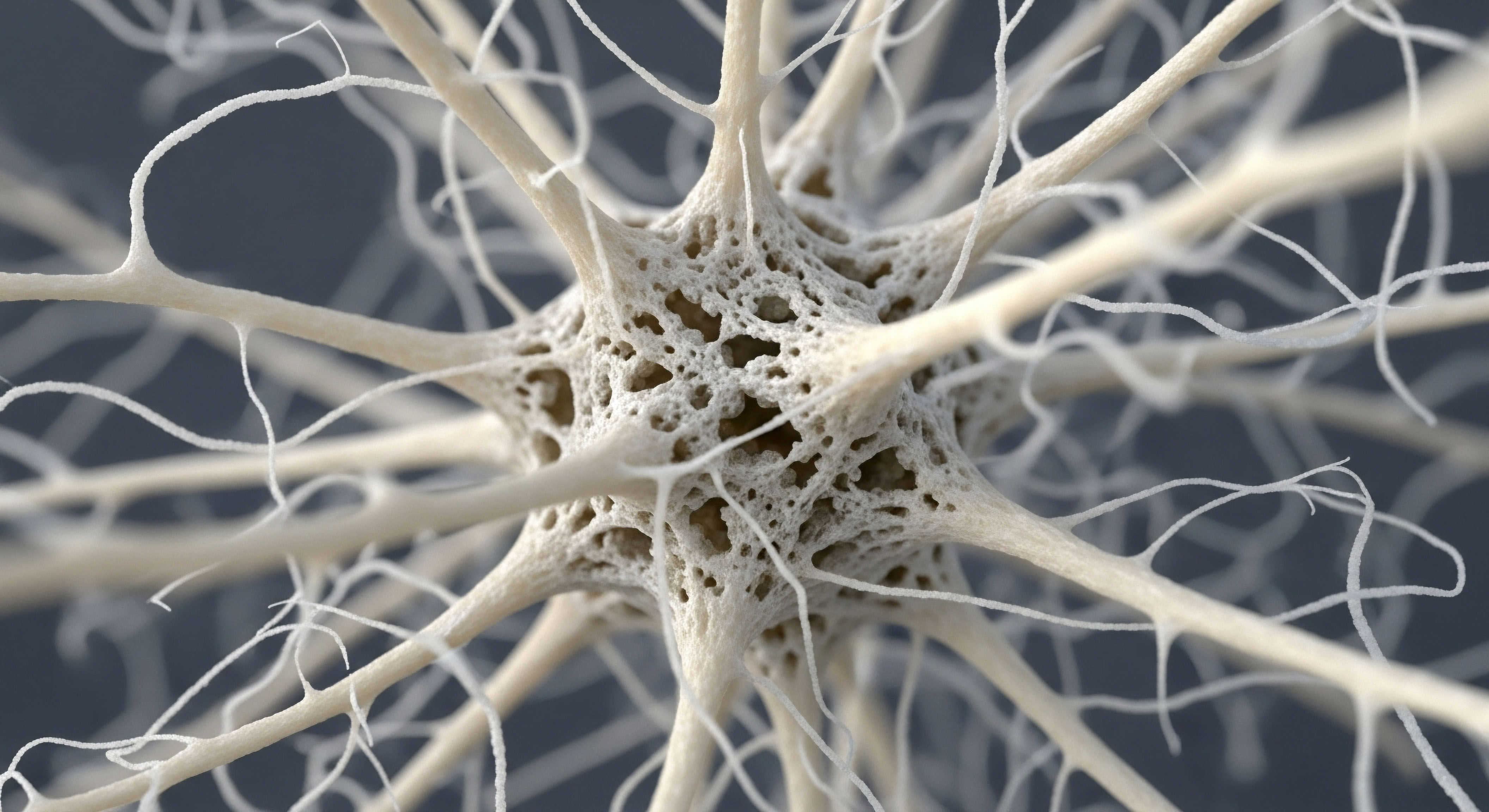

The Fading Spark the Biology of Declining Mental Acuity
The relentless march of time presents a universal challenge ∞ maintaining the sharpness, agility, and sheer processing power of the mind. As chronological age advances, a cascade of biological shifts can lead to a discernible dimming of cognitive fire. This isn’t an inevitable surrender to entropy, but rather a complex interplay of physiological changes that, when understood, can be strategically countered. The foundation of sustained mental vitality lies in grasping the core biological drivers that influence cognitive function as we age.

The Hormonal Tides of Cognitive Decline
Hormones are the body’s master communicators, orchestrating a vast symphony of cellular processes. As we mature, the finely tuned endocrine system undergoes predictable alterations, profoundly impacting brain function. For women, the sharp decline in estrogen levels post-menopause is a significant factor.
Estrogen is not merely a reproductive hormone; it acts as a potent neurotrophic agent, supporting synaptic plasticity, neurogenesis, and protecting neurons from oxidative stress and inflammation. Its diminished presence can lead to reduced memory, attention deficits, and increased susceptibility to mood disorders.
In men, while the decline is more gradual, a steady decrease in testosterone levels ∞ often termed andropause ∞ also carries cognitive implications. Testosterone plays a role in maintaining cognitive agility, mood regulation, and even neuroprotection. Lower levels have been associated with cognitive impairment, reduced processing speed, and diminished drive.
Beyond these primary sex hormones, other hormonal players like thyroid hormones, crucial for metabolic regulation and brain development, and DHEA, a precursor hormone with neurosteroid functions, also fluctuate with age, potentially contributing to cognitive slowdown. The hypothalamic-pituitary-gonadal (HPG) axis, a central regulatory system, can become dysregulated, impacting stress responses and hormonal balance, which in turn affects brain health.

Metabolic Underpinnings of Brain Aging
The brain is an energy-intensive organ, critically dependent on a stable and efficient metabolic supply. Age-related metabolic dysregulation is a significant contributor to cognitive decline. Insulin resistance, a hallmark of metabolic syndrome and type 2 diabetes, impairs the brain’s ability to utilize glucose effectively, its primary fuel source. This metabolic dysfunction can lead to reduced neurotrophic factor production, increased oxidative stress, and inflammation ∞ all detrimental to neuronal health and function.
Mitochondrial dysfunction, the cellular powerhouses, is another universal marker of aging. As mitochondria become less efficient, they produce fewer energy units (ATP) and generate more damaging reactive oxygen species (ROS). This oxidative stress can damage cellular components, including DNA and proteins, leading to impaired neuronal function and increased vulnerability to neurodegenerative processes. Genes involved in oxidative stress response and DNA repair are upregulated in the aging brain, highlighting the cellular battle against this damage.

Inflammation and Oxidative Stress ∞ The Silent Saboteurs
Chronic, low-grade inflammation, often termed “inflammaging,” is a pervasive characteristic of aging. This systemic inflammation can cross the blood-brain barrier, promoting neuroinflammation. Neuroinflammation, in turn, can disrupt synaptic function, impair neurogenesis, and contribute to the accumulation of toxic protein aggregates, such as amyloid-beta, a key feature of Alzheimer’s disease.
Oxidative stress, intrinsically linked to inflammation and mitochondrial dysfunction, further exacerbates cellular damage. The brain, with its high oxygen consumption and lipid-rich environment, is particularly susceptible. When the body’s antioxidant defenses are overwhelmed by free radical production, cellular damage accelerates, contributing to cognitive deficits and an increased risk of neurodegenerative conditions. These interconnected biological processes ∞ hormonal shifts, metabolic dysregulation, inflammation, and oxidative stress ∞ create a fertile ground for the decline in mental acuity we often associate with aging.


Engineering Peak Neural Output the Optimization Blueprint
Sustaining peak mental firepower beyond conventional age-related decline is not an passive acceptance of biological fate; it is an active, strategic engineering of the body’s core systems. This requires a sophisticated understanding of the mechanisms at play and the deployment of precise interventions.
The “Vitality Architect” approaches this challenge by viewing the body as a high-performance system, tunable for optimal cognitive and physical output. This involves a multi-pronged strategy encompassing hormonal optimization, the targeted use of peptides, and metabolic mastery.

Hormonal Recalibration ∞ Restoring the Master Regulators
The cornerstone of cognitive vitality lies in restoring hormonal balance. For women, this often involves Hormone Replacement Therapy (HRT) that carefully replenishes estrogen and progesterone lost during menopause. Beyond alleviating menopausal symptoms, strategically timed HRT can support neuroprotection, enhance memory, and potentially reduce the risk of dementia. The precise timing, often within a “critical window” around menopause, appears crucial for maximizing these cognitive benefits.
For men, testosterone replacement therapy (TRT) is a primary intervention. TRT can bolster cognitive function, improve mood, and increase mental energy, counteracting the effects of age-related testosterone decline. However, the optimization extends beyond primary sex hormones. Addressing suboptimal levels of thyroid hormones, which regulate metabolism and brain function, and precursor hormones like pregnenolone and DHEA, can further refine cognitive performance.
These interventions are not about supra-physiological levels, but about returning these critical signaling molecules to their optimal, youthful ranges, thereby recalibrating the endocrine system’s command center.

Peptide Power ∞ Targeted Cellular Instruction
Peptides, short chains of amino acids, act as sophisticated signaling molecules, delivering precise instructions to cells throughout the body, including the brain. Their targeted nature makes them exceptionally powerful tools for cognitive enhancement and neuroprotection. Certain peptides offer direct neuroprotective benefits by combating oxidative stress and inflammation, thereby preserving neuronal integrity and reducing age-related cognitive decline.
Examples of peptides with demonstrated or potential cognitive benefits include:
- Semax and Selank: These nootropic peptides are known for their ability to enhance mood, reduce anxiety, improve memory, and boost focus by modulating neurotransmitter activity and promoting neurogenesis. Semax, in particular, is linked to increased brain-derived neurotrophic factor (BDNF) levels, crucial for neuronal growth and survival.
- Cerebrolysin: This peptide preparation, derived from pig brains, has shown efficacy in improving cognitive function and aiding in the repair of damaged brain cells, making it a valuable tool for age-related cognitive decline and neurodegenerative conditions.
- Pinealon: Derived from natural brain tissue, Pinealon acts as a neuroprotector and mitochondrial booster, enhancing oxygen flow to the brain and improving attention, memory, and learning.
- NAD+ Precursors (e.g. NMN, NR): While not peptides themselves, these compounds support NAD+ levels, a critical coenzyme for cellular energy production and repair, which declines with age. Maintaining optimal NAD+ is vital for mitochondrial function and overall cellular health, including in the brain.
The strategic application of these peptides can amplify the brain’s natural repair mechanisms, enhance synaptic plasticity, and improve the efficiency of neural communication, leading to sharper thinking, better memory, and increased mental energy.

Metabolic Mastery ∞ Fueling the Cognitive Engine
The brain’s performance is inextricably linked to its metabolic environment. Optimizing this environment is paramount for sustained cognitive function. This involves a sophisticated approach to nutrition and exercise that prioritizes efficiency and resilience.
Nutritional Strategies:
- Low-Carbohydrate and Ketogenic Diets: By shifting the body’s primary fuel source from glucose to ketones, these diets can provide a more stable and efficient energy supply for the brain, particularly beneficial for individuals with insulin resistance.
- Nutrient Density: A diet rich in whole, unprocessed foods ∞ abundant in omega-3 fatty acids (found in fatty fish), antioxidants (from colorful fruits and vegetables), and essential vitamins and minerals ∞ supports neuronal health and combats oxidative stress. The green-Mediterranean diet, for instance, has shown promise in slowing brain aging by reducing protein markers linked to cognitive decline.
- Strategic Supplementation: Beyond macronutrients, specific micronutrients and compounds play vital roles. Omega-3 fatty acids (EPA and DHA) are critical components of neuronal membranes and support synaptic function. Antioxidants like CoQ10 and Vitamin E combat oxidative damage. Certain nootropics, when supported by robust science, can further enhance cognitive processes.
Exercise Protocols:
- Aerobic Exercise: Regular cardiovascular activity increases blood flow to the brain, delivering essential oxygen and nutrients, and stimulating the release of neurotrophic factors like BDNF, which support neuron growth and survival.
- Resistance Training: Building and maintaining muscle mass is critical for metabolic health and can positively influence hormonal balance. Strength training also contributes to overall brain health and can improve executive functions.
- High-Intensity Interval Training (HIIT): HIIT protocols can efficiently improve cardiovascular health and metabolic flexibility, contributing to a more resilient brain energy supply.
By meticulously managing hormonal balance, strategically deploying peptides, and optimizing metabolic inputs, individuals can construct a robust foundation for sustained mental firepower, defying the perceived limitations of age.


The Strategic Onset When to Deploy Interventions
The pursuit of sustained mental firepower is not a race; it is a meticulously planned campaign. Understanding the optimal timing and approach for implementing advanced strategies is as critical as the strategies themselves. This phase focuses on the judicious application of interventions, ensuring maximum efficacy and minimal risk, thereby orchestrating a personalized ascent to peak cognitive vitality.

Establishing the Baseline ∞ The Foundation of Precision
Before any intervention is considered, a comprehensive assessment of current physiological status is non-negotiable. This involves detailed biomarker analysis. For hormonal optimization, this means assessing levels of testosterone, estrogen, progesterone, thyroid hormones (TSH, free T3, free T4), DHEA-S, and cortisol, often measured at specific times of day to capture diurnal variations. Understanding these baseline levels is crucial for identifying specific deficiencies or imbalances that require correction.
Beyond hormones, metabolic markers such as fasting glucose, HbA1c, lipid profiles, and inflammatory markers (e.g. hs-CRP) provide a clear picture of the body’s energy regulation and inflammatory state. Neurocognitive assessments, ranging from simple cognitive tests to more detailed neuropsychological evaluations, can establish baseline cognitive function, identifying specific areas of strength and weakness. This data-driven approach ensures that interventions are precisely targeted, moving beyond generalized protocols to personalized strategies tailored to the individual’s unique biological landscape.

The Critical Window and Progressive Implementation
The efficacy of certain interventions, particularly hormone replacement therapy, is often time-sensitive. For women, the “critical window” hypothesis suggests that initiating estrogen therapy around the time of menopause, rather than many years later, yields greater cognitive benefits. This highlights the importance of proactive engagement with one’s biological trajectory.
Interventions should be implemented progressively. Rather than a wholesale overhaul, a phased approach allows the body to adapt and provides clearer data on individual responses. For example, one might begin with foundational metabolic and lifestyle adjustments (diet, exercise, sleep optimization), then introduce specific hormonal support if baselines indicate a need, followed by targeted peptide therapies if further cognitive enhancement is desired.
This layered approach minimizes the risk of overwhelming the system and allows for careful monitoring of outcomes and side effects. The goal is to integrate these powerful tools harmoniously, not to introduce disruptive shocks.

Monitoring, Adjustment, and the Long Game
The journey to sustained mental firepower is dynamic, requiring continuous monitoring and adaptive adjustments. Regular follow-up assessments ∞ re-testing biomarkers, re-evaluating cognitive performance, and monitoring subjective well-being ∞ are essential. What works optimally at one stage may need recalibration as the body responds or as life circumstances change.
The interplay between different systems means that adjustments in one area can influence others. For instance, optimizing thyroid function might impact sex hormone metabolism, or improving sleep quality could enhance the effectiveness of peptide therapies. A skilled practitioner acts as a systems engineer, observing these feedback loops and fine-tuning the protocol.
This long-term perspective views these interventions not as quick fixes, but as components of a sustained strategy for maintaining peak cognitive function and vitality throughout life. The focus is on building resilience and optimizing performance over decades, not just weeks or months.

The Unyielding Mind a Blueprint for Perpetual Brilliance
The notion that cognitive decline is an unavoidable consequence of aging is a narrative we can now decisively rewrite. We possess the scientific understanding and the technological tools to actively sculpt our mental trajectory. Sustained mental firepower is not a gift bestowed by genetics alone; it is an engineered outcome, a testament to proactive biological stewardship.
By understanding the intricate hormonal and metabolic underpinnings of cognitive vitality, and by strategically deploying advanced interventions like hormone optimization and peptide therapies, we move beyond merely managing age to mastering it. This is about reclaiming your biological prime, not as a fleeting moment, but as a sustained state of peak performance. The blueprint is clear ∞ assess, strategically intervene, and continuously refine. The power to maintain an unyielding, brilliant mind rests in your hands, ready to be architected.

Glossary

cognitive function

sustained mental

synaptic plasticity

oxidative stress

neuroprotection

hormonal balance

cognitive decline

neurogenesis

mental firepower

vitality

brain aging

metabolic health

sustained mental firepower




